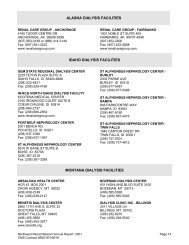Medicare's "You Can Live: Your Guide For Living With Kidney Failure"
Medicare's "You Can Live: Your Guide For Living With Kidney Failure"
Medicare's "You Can Live: Your Guide For Living With Kidney Failure"
- No tags were found...
You also want an ePaper? Increase the reach of your titles
YUMPU automatically turns print PDFs into web optimized ePapers that Google loves.
Cadaver donors are people who have just died and whose familieshave given their organs for others to use. <strong>For</strong> this kind oftransplant, you need to put your name on an official list withothers who also need a kidney. Talk to your health care teamabout what must be done to get your name on the list. When akidney becomes available, you can always choose not to have thetransplant, but you will not have this choice unless your name ison the list. When a kidney that matches your blood and tissuetype becomes available, you and your doctor will be called andsurgery will be done right away. Finding a kidney that is a goodmatch may take a short time or several years.The Choice to Stop TreatmentJust because there are treatment options doesn’t mean you haveto be treated. Some people choose to have no treatment or tostop treatment. This is a choice you can make, but understandthat treatment is keeping you alive. When you withdraw fromtreatment, or choose not to follow your treatment plan, you putyour life at risk. If you stop treatment completely, you will die.<strong>You</strong>r kidney doctor can give you more information about whathappens when you stop treatment. This is a personal choice thatmay be hard to make. If the time comes that you want to considerstopping treatment, talk with your family and your health careteam about counseling and programs such as hospice.Advance DirectivesIf you were to have a life-threatening medical emergency, you maynot be able to say what kind of treatment you would want. <strong>You</strong>have the right to choose ahead of time what you want done in caseof such an emergency. An advance directive, sometimes called a“living will,” is a legal paper that says what you want done for youin a life-threatening emergency. <strong>You</strong>r social worker can tell youabout advance directives. Tell your kidney doctor and center if youhave an advance directive. Make sure your doctor writes in yourorders that you have one and that an original copy is in your files.“<strong>You</strong> have theright to chooseahead of timewhat you wantdone in case ofsuch anemergency.”17











